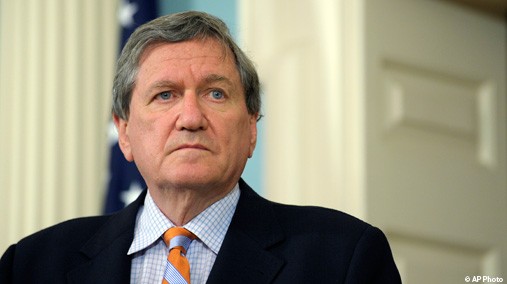In most Hollywood horror franchises we know that the villains – take your Michael Myers, Jason Voorhees, or your rakish Freddy Krueger – always come back. No matter what painful death or injury felled them in the previous romp, an endless string of potential victims means room for one more film. Make that 17 more.
The neoconservative war doctrine of aggressive military force and self-serving regime change did not die after the failed wars of Iraq and Afghanistan, which proponents pushed with an enthusiasm not equaled since the world tilted on its axis and Freddy met Jason in an epic hack-off. No, the neocons went nearly dormant (there is a Bram Stoker trope here, somewhere), reduced really, to sniping at Obama, but more or less biding their time until the next opportunity to manipulate global affairs in the Middle East.
That time, it seems, has come. We’re seeing subtle signs already this week as President Obama takes the country one step closer to air strikes against Bashar Assad’s military assets. We know one thing: neither the administration or military seem particularly interested in pursuing regime change or nation building (their “punitive strike” strategy of course is a topic for another post). However, with Sens. John McCain and Lindsey Graham as neocon spear points — push, push, pushing for military force, now! — neoconservative voices, old and new, are starting to hint that “to do it right,” we might be in Syria for a long time afterwards, helping the “new” government find its way.
Take for instance, Elizabeth O’Bagy.

Never heard of her? She is clearly a protégé of the Kagan Clan, representing Kimberly Kagan’s Institute for the Study of War. Kim Kagan, who is married to Fred Kagan (brother of Robert Kagan), is no doubt happy to put someone besides a Kagan to front her think tank, which frankly, is now aligned with the demise of Gens. David Petraeus and Stanley McChrystal, who turned to her and Fred as “consultants” in both Iraq and Afghanistan. Over the last several years, she’s written “The Surge: A Military History,” and numerous magazine articles and op-eds as panegyrics to General Petraeus and “his generals” and their now-discredited COIN pop-doctrine.
So sending out the signal for another regime change must be done carefully and with none of the old baggage. O’Bagy has a Ph.D but this appears to be her first job. She says she has traveled extensively with the rebel groups in Syria to essentially prove that there are moderates out there who the U.S can work with. But her recent appearances on FOX and other venues come across as bullet-point briefings with very little color. The bottom line for O’Bagy: the rebel groups can be parsed. We need not worry about the “extremists,” she insists, they are are outnumbered by the “more moderate groups” who will welcome American assistance (echoes of the Iraqi National Congress?).

And then for the capstone — “there needs to be more than just punitive measures” she charged on FOX Monday night. “These moderate forces .. could quickly be taken over by the ideology of these extremist groups,” if we don’t do more than just strike, she added. O’Bagy doesn’t say “regime change” is necessary, but she certainly suggests it.
This is fascinating because this is the second time, at least, that O’Bagy has been given over 5 minutes of coveted Special Report time on FOX to describe events in Syria, even though there is a city filled with more experienced foreign policy and military analysts and journalists outside [Note: Special Report gets about 1.9 million viewers each night]. She’s spreading the word at different think tank discussions in Washington, too, like here and here.
While O’Bagy appears to be a gentle enough scout for what will no doubt turn into a full-blown message-control and lobbying campaign, there are more strident neoconservative foot soldiers in the ranks. Like Charles Krauthammer, who all but dared Obama to take out Assad on Special Report tonight. Like former George W speechwriter Michael Gerson, who in Tuesday’s Washington Post laid it all on the line:
The best-case scenario is probably this: a negotiated outcome in which Assad departs and other regime elements agree to form an interim government with the non-extremist members of the opposition. The new government would then need to engage in a multi-year power struggle (aided by the United States) with the jihadists. But this approach would require convincing the regime it can’t win militarily. Which would probably only happen after a Kosovo-style, Western air campaign.
Wow. If I close my eyes and listen to this read out loud and replace “Assad” with “Saddam,” I can almost make out the contours of our failed war in Iraq. If I close my eyes long enough I may see Freddy Krueger, which to tell you the truth is a less scary prospect. Sorry Freddy, maybe it’s time to find another day job after all.
UPDATE: We cannot forget the notoriously neoconservative Washington Post editorial page, which on Tuesday warned that seeing “moderate forces prevail … can’t be achieved with one or two volleys of cruise missiles.” Here’s more:
The United States can’t dictate the outcome in Syria, and it would be foolish to send ground troops in an effort to do so. But by combining military measures with training, weapons supplies and diplomacy, it could exercise considerable influence. The military measures could include destroying forces involved in chemical weapons use and elements of the Syrian air force that have been used to target civilians, as well as helping to carve out a safe zone for rebels and the civilian populations they are seeking to protect.
Such military action should be seen as one component of a policy that finally recognizes a U.S. interest in helping to shape Syria’s future.
UPDATE II : The old gang, back together: The Weekly Standard publishes fatuous letter to the president offering assistance with Syria. Supposedly it includes signatories from “all over the ideological spectrum,” but that is a joke. Not when you are talking Bill Kristol, Elliot Abrams, Cliff May, Joe Lieberman, Robert Kagan, Martin Peretz, Karl Rove, Dan Senor …. you get the point. And not a true realist or anti-interventionist in sight. Not surprising, though, when you see the bottom line :
It is therefore time for the United States to take meaningful and decisive actions to stem the Assad regime’s relentless aggression, and help shape and influence the foundations for the post-Assad Syria that you have said is inevitable.







